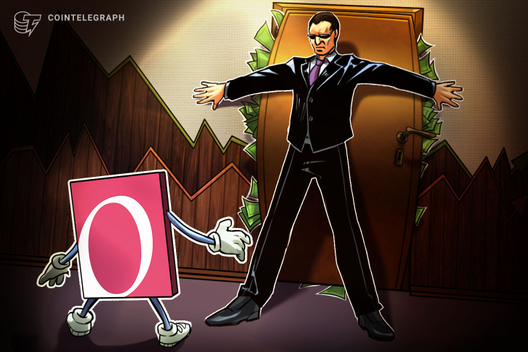Bitcoin price short-term pullback is very possible for 4 key reasons
The price of Bitcoin (BTC) is now stagnating below $19,000 after four failed attempts to break out of the $19,600 resistance level. In the near term, four factors suggest that a pullback is more likely than a clean breach of the all-time-high price near $20,000. Traders and technical analysts are mostly cautious regarding the near-term price trend of Bitcoin, seemingly waiting for BTC to establish a clear support level or break past its record high.
There are four factors that make a correction likely, and all of these factors could amplify the selling pressure on BTC while decreasing buyer demand for Bitcoin in the foreseeable future. The price of BTC falling in tandem with the stock market could further amplify the nervousness around risk-on assets, including Bitcoin.
On Dec. 8, the price of Bitcoin fell particularly hard within a short period. On Binance, Bitcoin declined from $19,294 to $18,610 within merely 12 hours. A pseudonymous trader known as “Byzantine General” pinpointed an 857 BTC buy order at $18,750 on Bitfinex, which is equivalent to $15.94 million. However, the order disappeared as the price neared $18,750, suggesting it was a spoof order.
As the $18,750 buy order faded, the support level thinned out, and Bitcoin eventually fell to $18,610 across major exchanges. For nearly two weeks, the $18,500–$18,600 range has acted as a strong support area for BTC. If Bitcoin continues to drop below $18,500, traders say that the $16,000 support level could be tested before BTC’s next rally. Another pseudonymous trader known as “Crypto Capo” said that below $18,500, a short-term bearish move could materialize, possibly reaching $16,750.
The $19,500–$20,000 resistance area is a major roadblock
For traders, Bitcoin is currently in an unfavorable position because it’s both far from its resistance level and the major support area. So far, throughout the past week, BTC has remained relatively comfortable above the $18,500 support level, following three successful recoveries. But with continued retests of the same support area, buying or longing BTC at $18,500 has become less compelling.
As such, a trader known as “Salsa Tekila” said that the ideal trade is to either buy Bitcoin at the low support, such as $16,000s or $17,000s, or above $20,000. The trader said that it makes more sense to short-term trade the current price range until BTC decisively rises above its all-time high or sees a deep correction.
Similarly, Koroush AK, a cryptocurrency trader, said that a “decent dip buying opportunity” would arise at a lower support level, emphasizing the $18,300–$18,400 range as a potential support area. Still, the trader noted that some lower time frame candles would have to close, such as the four-hour candle, to establish more clarity on the price cycle of Bitcoin, adding: “Still waiting on the 4H close but it’s looking like we’re heading lower, which would provide a decent dip buying opportunity.”
Miners are selling Bitcoin
According to data from CryptoQuant, miners that were previously inactive began to sell Bitcoin once again. In a private note to its clients, analysts said that the “Miner’s Position Index” reached a new yearly high. This is indicative of miners applying selling pressure on Bitcoin, which raises the probability of further consolidation or a larger price drop.
In the cryptocurrency market, there are two major sources of external selling pressure: miners and exchanges. On-chain analyst Willy Woo previously explained that miners selling BTC and exchanges selling their earnings from fees are two of the biggest unmatched selling pressures in the market. Considering this, miners continuing to sell BTC while Bitcoin struggles under a major resistance level makes a breakout challenging in the near term. The note from CryptoQuant read:
“The ‘Miner’s Position Index, MPI’, which had remained negative for most of this year, has recently reached a moving average of 1.5, a new record high for this year. Looking at historical patterns, this isn’t so high that we expect the bull market to end, but it could be sufficient to cool things off for a short period.”
“OG” investors are not buying
Long-time Bitcoin holders who hoard large amounts of BTC have also stopped buying BTC in the past several days. CryptoQuant analysts noted that old whales “are wanting the price to drop, or at least are expecting it to do so,” based on on-chain data points.

Whale clusters on Whalemap, an on-chain analysis platform that tracks Bitcoin whale activity, show a similar trend. On Dec. 7, Whalemap analysts said that the whale clusters show three near-term support areas at $18,979, $17,651 and $17,170.
Whale clusters form when whales accumulate or buy Bitcoin at a certain level and do not move the BTC. It essentially shows where whales last bought BTC and at which price level they are willing to hold BTC. Since BTC dropped below $18,979 on Dec. 8, whales could try to bid or buy into the latter two support areas.
The stock market is declining
Throughout the pre-market trading session on Dec. 8, the Dow Jones Industrial Average and the S&P 500 posted a minor pullback. The stagnancy of major United States stock market indices comes after weeks of rallying. JPMorgan Chase said that the U.S. stock market could face a pullback in January if longing U.S. equities becomes an overcrowded trade.
As the stock market starts to show signs of a short-term slump, the “smart money index” reached a yearly low. The index gauges the sentiment of money managers and institutional investors, who appear to be skeptical during the ongoing rally. It indicates that the stock market rally has been fueled by retail investors, which could be a concerning trend if a correction occurs in January.
Based on various factors, including the inactivity of whales, the sell-off of miners and the uncertainty in the risk-on market, analysts remain cautious in the near term. CryptoQuant noted that retail investors are active, yet the cautiousness of whales remains a negative variable for Bitcoin: “In the short term, it looks like there is a high chance that Bitcoin will continue to consolidate or have one more correction. Retail investors are very active, but the whales are moving in ways that aren’t helpful to keep Bitcoin rising.”

But the bullish momentum may sustain, with Rafael Schultze-Kraft — chief technical officer at Glassnode — outlining $18,640, $18,450 and $17,655 as important short-term support levels based on on-chain data. As long as the price of Bitcoin remains above these three levels and the abovementioned whale clusters, the dominant cryptocurrency could avoid a deep correction to the $14,000–$16,000 range.









